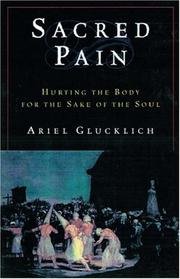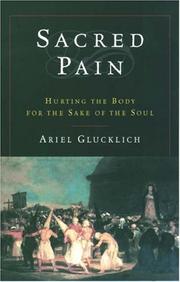| Listing 1 - 8 of 8 |
Sort by
|

ISBN: 0199839492 128152901X 0198030401 9780198030409 0195132548 9780195132540 0195169433 9780195169430 9781281529015 Year: 2001 Publisher: Oxford ; New York : Oxford University Press,
Abstract | Keywords | Export | Availability | Bookmark
 Loading...
Loading...Choose an application
- Reference Manager
- EndNote
- RefWorks (Direct export to RefWorks)
Why would anyone seek out the very experience the rest of us most wish to avoid? Why would religious worshipers flog or crucify themselves, sleep on spikes, hang suspended by their flesh, or walk for miles through scorching deserts with bare and bloodied feet?. In this insightful new book, Ariel Glucklich argues that the experience of ritual pain, far from being a form of a madness or superstition, contains a hidden rationality and can bring about a profound transformation of the consciousness and identity of the spiritual seeker. Steering a course between purely cultural and purely biological
Pain -- Religious aspects. --- Ritual -- Psychology. --- Pain --- Ritual --- Religious aspects --- Psychology --- Religious aspects. --- Psychology.
Book
ISBN: 0810873982 1299135854 9780810873988 9780810870246 081087024X 9780810861541 0810861542 9781299135857 Year: 2009 Publisher: Lanham [Wilmore, Ky.] Scarecrow Press Center for the Study of World Christian Revitalization Movements
Abstract | Keywords | Export | Availability | Bookmark
 Loading...
Loading...Choose an application
- Reference Manager
- EndNote
- RefWorks (Direct export to RefWorks)
Pain, Passion and Faith: Revisiting the Place of Charles Wesley in Early Methodism is a significant study of the 18th-century poet and preacher Charles Wesley. Wesley was an influential figure in 18th-century English culture and society; he was co-founder of the Methodist revival movement and one of the most prolific hymn-writers in the English language. His hymns depict the Christian life as characterized by a range of intense emotions, from ecstatic joy to profound suffering.
Methodist Church - Doctrines. --- Methodist Church - History and criticism. --- Methodist Church - Hymns - History and criticism. --- Pain - Religious aspects - Christianity. --- Suffering - Religious aspects - Christianity. --- Wesley, Charles. --- Suffering --- Pain --- Methodist Church --- Christian sects --- Religious aspects --- Christianity. --- Hymns --- History and criticism. --- Doctrines. --- Wesley, Charles,

ISBN: 0203210069 1134798954 1280324376 9780203210062 9780415113632 0415113636 9780415127066 0415127068 0415113636 0415127068 9781134798902 9781134798940 9781134798957 1134798946 Year: 1995 Publisher: London New York Routledge
Abstract | Keywords | Export | Availability | Bookmark
 Loading...
Loading...Choose an application
- Reference Manager
- EndNote
- RefWorks (Direct export to RefWorks)
The Suffering Self is a ground-breaking, interdisciplinary study of the spread of Christianity across the Roman empire. Judith Perkins shows how Christian narrative representation in the early empire worked to create a new kind of human self-understanding - the perception of the self as sufferer. Drawing on feminist and social theory, she addresses the question of why forms of suffering like martyrdom and self-mutilation were so important to early Christians.This study crosses the boundaries between ancient history and the study of early Christianity, seeing Christian representati
Suffering --- Pain --- Identification (Religion) --- Identity (Religion) --- Religious identity --- Psychology, Religious --- Aches --- Emotions --- Pleasure --- Senses and sensation --- Symptoms --- Analgesia --- Affliction --- Masochism --- Religious aspects --- Christianity --- History of doctrines --- History --- Suffering - Religious aspects - Christianity - History of doctrines - Early church, ca. 30-600. --- Pain - Religious aspects - Christianity - History of doctrines - Early church, ca. 30-600. --- Identification (Religion) - History - To 1500.
Book
ISBN: 2204068764 9782204068765 Year: 2002 Publisher: Paris Cerf
Abstract | Keywords | Export | Availability | Bookmark
 Loading...
Loading...Choose an application
- Reference Manager
- EndNote
- RefWorks (Direct export to RefWorks)
Face aux assauts ou à la présence lancinante de la douleur, le mot d'ordre est aujourd'hui de la combattre par tous les moyens, et ils sont de plus en plus efficaces. Cette lutte n'accepte plus les renoncements et les défaillances. Elle refuse plus encore quelque justification que ce soit qui prétendrait donner un " sens " à la souffrance, comme si une telle quête ne faisait que démobiliser patients et soignants, qu'encourager le fatalisme ou, pire encore, le masochisme. Prenant au sérieux ces défis, des hommes et des femmes qui travaillent comme médecins, infirmiers, psychothérapeutes, philosophes, théologiens, ont confronté leurs pratiques et leurs questions lors d'un colloque interdisciplinaire, tenu en 1999 à l'Université catholique de Lyon conjointement par le Centre de bioéthique et la Faculté de théologie. Cet ouvrage contient l'ensemble des interventions qui ont apporté des expériences de praticiens et des réflexions plus théoriques. Elles se croisent sur le questionnement suivant : si on refuse le postulat utopique que seule une existence enfin libérée de toute forme de douleur serait vraiment et pleinement humaine, que pouvons-nous construire sur la conviction que la vie doit être vécue telle qu'elle se donne à chacun, en combattant contre les causes de la douleur et en résistant aux effets mortifères du souffrir ? Ces approches plurielles ne cherchent donc pas à donner la réponse à la question du sens de la souffrance. Elles invitent plutôt les sujets en relation les uns avec les autres à s'ouvrir, y compris à travers l'épreuve, à la vérité de ce qu'est vivre pour les humains.
Suffering --- Pain --- Religious aspects --- Christianity. --- pijn (lijden, pijnbestrijding) --- filosofie (filosofische aspecten) --- zorg (zorgverstrekking, zorgverlening) --- katholicisme --- protestantisme --- patiëntenrechten (rechten van de patiënt) --- kinderen --- ouderdom --- douleur (souffrance, lutte contre la douleur) --- philosophie (aspects philosophiques) --- soins (prestation de soins) --- catholicisme --- droits du patient (droits des malades) --- enfants --- vieillesse --- christendom --- christianisme --- Affliction --- Aches --- Religious aspects&delete& --- Christianity --- Masochism --- Emotions --- Pleasure --- Senses and sensation --- Symptoms --- Analgesia --- Suffering - Religious aspects - Christianity. --- Pain - Religious aspects - Christianity.
Book
ISBN: 9780226112671 0226112675 Year: 2010 Publisher: Chicago, Ill. University of Chicago Press
Abstract | Keywords | Export | Availability | Bookmark
 Loading...
Loading...Choose an application
- Reference Manager
- EndNote
- RefWorks (Direct export to RefWorks)
This book provides an integral, readable account of changing attitudes toward pain in late medieval Europe. Since pain itself cannot be known, the book looks at pain by chronicling what people wrote about it, and what they did with and about that.
History of civilization --- Thematology --- anno 500-1499 --- Pain in literature --- Pain --- Suffering --- Torture --- Literature, Medieval --- Middle Ages --- History --- Religious aspects --- Christianity --- History and criticism --- Middle Ages. --- Pain in literature. --- History and criticism. --- Christianity. --- Stress, Psychological --- Religious aspects&delete& --- history --- Dark Ages --- History, Medieval --- Medieval history --- Medieval period --- World history, Medieval --- World history --- Civilization, Medieval --- Medievalism --- Renaissance --- Affliction --- Masochism --- Aches --- Emotions --- Pleasure --- Senses and sensation --- Symptoms --- Analgesia --- Cruelty --- Punishment --- Extraordinary rendition --- Pain - History - To 1500 --- Suffering - History - To 1500 --- Torture - History - To 1500 --- Pain - Religious aspects - Christianity --- Suffering - Religious aspects - Christianity --- Literature, Medieval - History and criticism

ISBN: 9780195169430 0195132548 0195169433 9780195132540 Year: 2001 Publisher: New York (N.Y.): Oxford university press
Abstract | Keywords | Export | Availability | Bookmark
 Loading...
Loading...Choose an application
- Reference Manager
- EndNote
- RefWorks (Direct export to RefWorks)
Philosophical anthropology --- Pain --- Ritual --- Religious aspects. --- Psychology. --- 291.4 --- 248.218 --- 248.233 --- -Ritual --- -Cult --- Cultus --- Liturgies --- Public worship --- Symbolism --- Worship --- Rites and ceremonies --- Ritualism --- Aches --- Emotions --- Pleasure --- Senses and sensation --- Symptoms --- Analgesia --- Suffering --- Godsdienstwetenschap: religieus leven; ascese; vroomheid; mystiek --- Mystiek lijden --- Excessen in geestelijke concentratie en kastijding --- Religious aspects --- Psychology --- -Godsdienstwetenschap: religieus leven; ascese; vroomheid; mystiek --- 248.233 Excessen in geestelijke concentratie en kastijding --- 248.218 Mystiek lijden --- 291.4 Godsdienstwetenschap: religieus leven; ascese; vroomheid; mystiek --- -248.233 Excessen in geestelijke concentratie en kastijding --- Cult --- Pain - Religious aspects. --- Ritual - Psychology.
Book
ISBN: 220402922X 9782204029223 Year: 1988 Publisher: Paris Cerf
Abstract | Keywords | Export | Availability | Bookmark
 Loading...
Loading...Choose an application
- Reference Manager
- EndNote
- RefWorks (Direct export to RefWorks)
Suffering. --- Alienation (Philosophy) --- Pain --- Theological anthropology --- Suffering of God. --- Religious aspects --- Christianity. --- Christianity --- 216.5 --- 231.512 --- Suffering --- -Man (Christian theology) --- Suffering of God --- God --- God, Pain of --- God, Suffering of --- Impassibility of God --- Pain of God --- Passibility of God --- Man (Christian theology) --- Aches --- Emotions --- Pleasure --- Senses and sensation --- Symptoms --- Analgesia --- Estrangement (Philosophy) --- Philosophy --- Affliction --- Masochism --- Goed en kwaad: lijden --- Goed en kwaad. Lijden. God en het kwaad --- -Christianity --- Impassibility --- Passibility --- Attributes --- 231.512 Goed en kwaad. Lijden. God en het kwaad --- 216.5 Goed en kwaad: lijden --- Religious aspects&delete& --- Pain - Religious aspects - Christianity. --- Theological anthropology - Christianity

ISBN: 0415113636 0415127068 9780415113632 9780415127066 Year: 1995 Publisher: London Routledge
Abstract | Keywords | Export | Availability | Bookmark
 Loading...
Loading...Choose an application
- Reference Manager
- EndNote
- RefWorks (Direct export to RefWorks)
Suffering --- Pain --- Identification (Religion) --- Religious aspects --- Christianity --- History of doctrines --- History --- History of civilization --- Christian church history --- 231.512 --- #GOSA:II.P.Alg.M --- 231.512 Goed en kwaad. Lijden. God en het kwaad --- Goed en kwaad. Lijden. God en het kwaad --- Aches --- Emotions --- Pleasure --- Senses and sensation --- Symptoms --- Analgesia --- Affliction --- Masochism --- Identity (Religion) --- Religious identity --- Psychology, Religious --- Suffering - Religious aspects - Christianity - History of doctrines - Early church, ca. 30-600. --- Pain - Religious aspects - Christianity - History of doctrines - Early church, ca. 30-600. --- Identification (Religion) - History - To 1500.
| Listing 1 - 8 of 8 |
Sort by
|

 Search
Search Feedback
Feedback About UniCat
About UniCat  Help
Help News
News